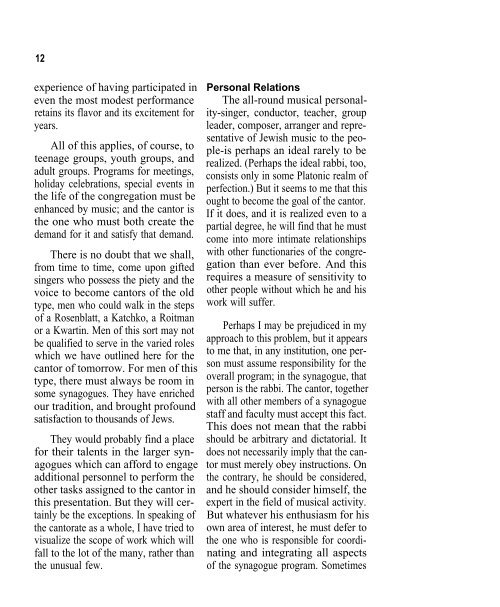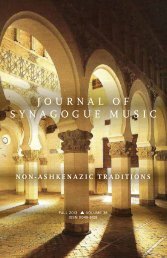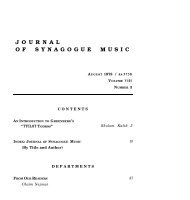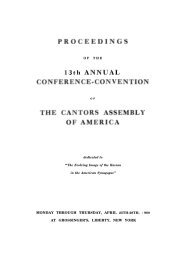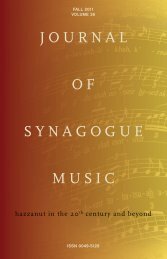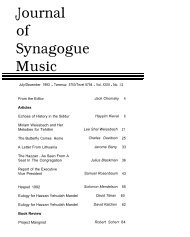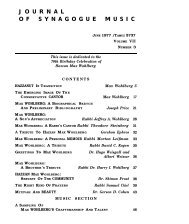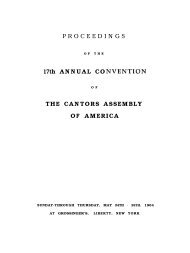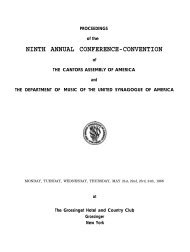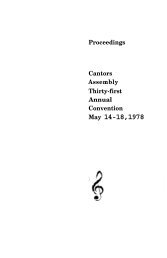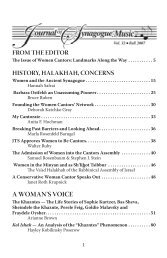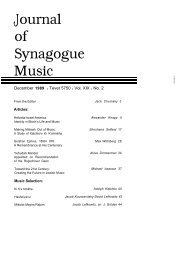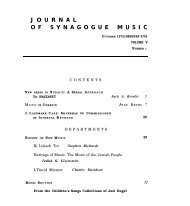Volume 16, Number 2 - Cantors Assembly
Volume 16, Number 2 - Cantors Assembly
Volume 16, Number 2 - Cantors Assembly
You also want an ePaper? Increase the reach of your titles
YUMPU automatically turns print PDFs into web optimized ePapers that Google loves.
12<br />
experience of having participated in<br />
even the most modest performance<br />
retains its flavor and its excitement for<br />
years.<br />
All of this applies, of course, to<br />
teenage groups, youth groups, and<br />
adult groups. Programs for meetings,<br />
holiday celebrations, special events in<br />
the life of the congregation must be<br />
enhanced by music; and the cantor is<br />
the one who must both create the<br />
demand for it and satisfy that demand.<br />
There is no doubt that we shall,<br />
from time to time, come upon gifted<br />
singers who possess the piety and the<br />
voice to become cantors of the old<br />
type, men who could walk in the steps<br />
of a Rosenblatt, a Katchko, a Roitman<br />
or a Kwartin. Men of this sort may not<br />
be qualified to serve in the varied roles<br />
which we have outlined here for the<br />
cantor of tomorrow. For men of this<br />
type, there must always be room in<br />
some synagogues. They have enriched<br />
our tradition, and brought profound<br />
satisfaction to thousands of Jews.<br />
They would probably find a place<br />
for their talents in the larger synagogues<br />
which can afford to engage<br />
additional personnel to perform the<br />
other tasks assigned to the cantor in<br />
this presentation. But they will certainly<br />
be the exceptions. In speaking of<br />
the cantorate as a whole, I have tried to<br />
visualize the scope of work which will<br />
fall to the lot of the many, rather than<br />
Personal Relations<br />
The all-round musical personality-singer,<br />
conductor, teacher, group<br />
leader, composer, arranger and representative<br />
of Jewish music to the people-is<br />
perhaps an ideal rarely to be<br />
realized. (Perhaps the ideal rabbi, too,<br />
consists only in some Platonic realm of<br />
perfection.) But it seems to me that this<br />
ought to become the goal of the cantor.<br />
If it does, and it is realized even to a<br />
partial degree, he will find that he must<br />
come into more intimate relationships<br />
with other functionaries of the congregation<br />
than ever before. And this<br />
requires a measure of sensitivity to<br />
other people without which he and his<br />
work will suffer.<br />
Perhaps I may be prejudiced in my<br />
approach to this problem, but it appears<br />
to me that, in any institution, one person<br />
must assume responsibility for the<br />
overall program; in the synagogue, that<br />
person is the rabbi. The cantor, together<br />
with all other members of a synagogue<br />
staff and faculty must accept this fact.<br />
This does not mean that the rabbi<br />
should be arbitrary and dictatorial. It<br />
does not necessarily imply that the cantor<br />
must merely obey instructions. On<br />
the contrary, he should be considered,<br />
and he should consider himself, the<br />
expert in the field of musical activity.<br />
But whatever his enthusiasm for his<br />
own area of interest, he must defer to<br />
the one who is responsible for coordinating<br />
and integrating all aspects<br />
the unusual few. of the synagogue program. Sometimes


